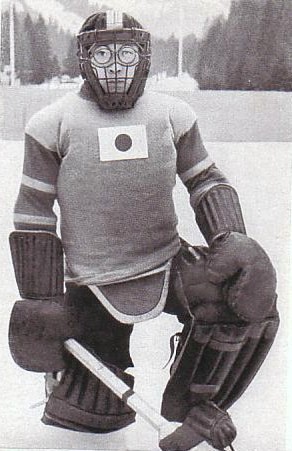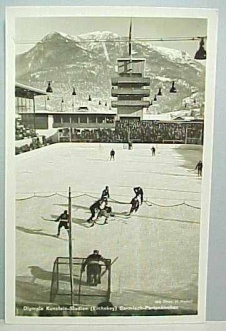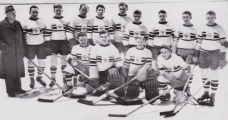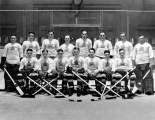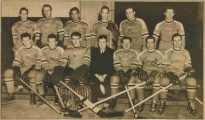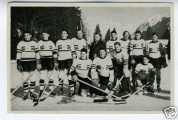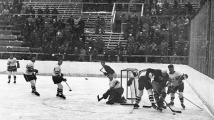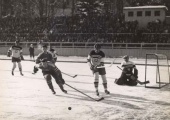1936 Winter Olympics
| 1936 Winter Olympics | |
|---|---|
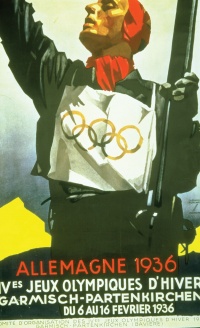
| |
| Tournament details | |
| Host nation | |
| Dates | 19–27 January |
| Teams | 15 |
| Venue(s) | Große Olympiaschanze, Riessersee (in 1 host city) |
| Champions | |
| Tournament statistics | |
| Games played | 37 |
| Goals scored | 165 (4.46 per game) |
| Scoring leader(s) | |
At the 1936 Winter Olympics, in Garmisch-Partenkirchen, the ice hockey competition would also count as that year's Ice Hockey World Championships and Ice Hockey European Championships.
The British National Team pulled off a major upset when they won the gold medal, marking a number of firsts in international ice hockey competition. Great Britain made history as the first team ever to win the Olympic, World, and European Championships and the first to win all three in the same year.[1] They were the first team to stop Canada from winning the Olympic ice hockey gold, following Canada's four consecutive gold medals. Great Britain also became the first European nation to win the World Championships, following eight wins by Canada and one by the United States.
Tournament summary
In previous Olympics, the British team had finished third (1924), and fourth (1928) but with teams that were, "largely composed of Canadian Army officers and university graduates living in the U.K."[1] It was decided that their team must be British-born this time, and while only one player on the team was born in Canada, nine of the thirteen players on the roster grew up in Canada, and eleven had played previously in Canada.[1] The CAHA, upon discovering that the rosters of the British and French teams were made up of primarily Canadians, whom they believed were ineligible, lodged a protest, and suspended the players in question.[1][2] As a result, the IIHF voted unanimously to ban Alex Archer and James Foster, however before tournament play began, Canada withdrew their protest.[3] Still unhappy with the state of affairs were the Americans, who believed the rules were not being followed,[3] and the French who were very angry that Canada did not repeal their protest with them.[2]
The tournament itself featured very close play for the medals. It was played in three rounds beginning with four groups, where the two best teams of each group moved on to two groups of four, where again the two best moved on to a final round robin group of four, to determine the medals. In the first round the Italians pulled off a major upset by beating the USA two to one, though USA would still advance to the second round.[1]
The second major upset occurred in the semi-finals, when Britain's Edgar Brenchley scored late in the third to defeat Canada two to one, setting up the eventual gold medal outcome. The format at these Olympics was to have head-to-head results from the semi-finals carried forward, so that the finals could be a four team round robin with only two additional games per team. The British team's shock victory over the Canadians, plus the win by USA over Czechoslovakia, both counted in the tables for the final round.[1] In the final round, the British team beat Czechoslovakia. then played six scoreless periods against USA before the game was called a tie, ensuring a silver or gold for the British. In the tournament's final game, Canada could win silver, and Britain gold, if Canada defeated USA, while the Americans could still achieve gold in a variety of tie-breaking scenarios. The Americans were very tired from the marathon scoreless tie, and lost one to nothing.
Another story of this Olympic hockey tournament was the participation of Rudi Ball. The Nazi leadership allowed this top player to lead their hockey team at these German hosted Olympics, making him the only Jew to represent Germany at these Olympic games.[3]
Medalists
First round
Top two teams in each group advanced to Second Round
Group A
| Pld | W | T | L | GF | GA | Pts | |
|---|---|---|---|---|---|---|---|
| 3 | 3 | 0 | 0 | 24 | 3 | 6 | |
| 3 | 2 | 0 | 1 | 11 | 7 | 4 | |
| 3 | 1 | 0 | 2 | 11 | 12 | 2 | |
| 3 | 0 | 0 | 3 | 3 | 27 | 0 |
| 6 February | 8-1 (5-0,2-1,1-0) |
||
| 7 February | 11-0 (2-0,3-0,6-0) |
||
| 7 February | 2-1 (0-0,0-0,2-1) |
||
| 8 February | 5-2 (4-0,1-2,0-0) |
||
| 8 February | 9-2 (1-0,4-0,4-2) |
||
| 9 February | 7-1 (4-0,0-0,3-1) |
Group B
| Pld | W | T | L | GF | GA | Pts | |
|---|---|---|---|---|---|---|---|
| 3 | 2 | 0 | 1 | 5 | 1 | 4 | |
| 3 | 2 | 0 | 1 | 5 | 2 | 4 | |
| 3 | 1 | 0 | 2 | 2 | 5 | 2 | |
| 3 | 1 | 0 | 2 | 1 | 5 | 2 |
| 6 February | 0-1 (0-1,0-0,0-0) |
||
| 7 February | 3-0 (0-0,3-0,0-0) |
||
| 7 February | 3-0 (1-0,1-0,1-0) |
||
| 8 February | 2-0 (0-0,1-0,1-0) |
||
| 8 February | 1-2 (0-0,0-0,1-1,0-0,0-1) |
||
| 9 February | 1-0 (0-0,1-0,0-0) |
Group C
| Pld | W | T | L | GF | GA | Pts | |
|---|---|---|---|---|---|---|---|
| 3 | 3 | 0 | 0 | 10 | 0 | 6 | |
| 3 | 2 | 0 | 1 | 14 | 5 | 4 | |
| 3 | 1 | 0 | 2 | 4 | 7 | 2 | |
| 3 | 0 | 0 | 3 | 4 | 20 | 0 |
| 6 February | 11-2 (1-1,2-0,8-1) |
||
| 7 February | 5-0 (0-0,4-0,1-0) |
||
| 7 February | 3-0 (0-0,1-0,2-0) |
||
| 8 February | 3-0 (1-0,1-0,1-0) |
||
| 8 February | 4-2 (1-0,0-1,0-0,1-1,2-0) |
||
| 9 February | 2-0 (0-0,1-0,1-0) |
Group D
| Pld | W | T | L | GF | GA | Pts | |
|---|---|---|---|---|---|---|---|
| 2 | 2 | 0 | 0 | 4 | 0 | 4 | |
| 2 | 1 | 0 | 1 | 2 | 1 | 2 | |
| 2 | 0 | 0 | 2 | 0 | 5 | 0 |
| 6 February | 1-0 (1-0,0-0,0-0) |
||
| 7 February | 3-0 (2-0,0-0,1-0) |
||
| 8 February | 2-0 (1-0,1-0,0-0) |
Second round
Top two teams in each group advanced to Final Round.
Group A
| Pld | W | T | L | GF | GA | Pts | |
|---|---|---|---|---|---|---|---|
| 3 | 2 | 1 | 0 | 8 | 3 | 5 | |
| 3 | 2 | 0 | 1 | 22 | 4 | 4 | |
| 3 | 1 | 1 | 1 | 5 | 8 | 3 | |
| 3 | 0 | 0 | 3 | 2 | 22 | 0 |
| 11 February | 2-1 (0-0,1-0,1-1) |
||
| 11 February | 2-1 (1-1,0-0,1-0) |
||
| 12 February | 1-1 (0-0,0-1,1-0,0-0) |
||
| 12 February | 15-0 (3-0,9-0,3-0) |
||
| 13 February | 5-1 (1-0,3-1,1-0) |
||
| 13 February | 2-6 (0-1,0-3,2-2) |
Group B
| Pld | W | T | L | GF | GA | Pts | |
|---|---|---|---|---|---|---|---|
| 3 | 3 | 0 | 0 | 5 | 1 | 6 | |
| 3 | 2 | 0 | 1 | 6 | 4 | 4 | |
| 3 | 1 | 0 | 2 | 3 | 6 | 2 | |
| 3 | 0 | 0 | 3 | 1 | 4 | 0 |
| 11 February | 2-0 (0-0,2-0,0-0) |
||
| 11 February | 1-0 (1-0,0-0,0-0) |
||
| 12 February | 1-0 (0-0,1-0,0-0) |
||
| 12 February | 4-1 (0-1,2-0,2-0) |
||
| 13 February | 2-1 (0-0,1-1,1-0) |
||
| 13 February | 2-1 (0-0,2-1,0-0) |
Final round
| Pld | W | T | L | GF | GA | Pts | |
|---|---|---|---|---|---|---|---|
| 3 | 2 | 1 | 0 | 7 | 1 | 5 | |
| 3 | 2 | 0 | 1 | 9 | 2 | 4 | |
| 3 | 1 | 1 | 1 | 2 | 1 | 3 | |
| 3 | 0 | 0 | 3 | 0 | 14 | 0 |
| 11 February | 2-1 (1-1, 0-0, 1-0) |
||
| 11 February | 2-0 (0-0, 2-0, 0-0) |
||
| 14 February | 5-0 (2-0,3-0,0-0) |
||
| 15 February | 7-0 (3-0,3-0,1-0) |
||
| 15 February | 0-0 (0-0,0-0,0-0,0-0,0-0,0-0) |
||
| 16 February | 1-0 (1-0,0-0,0-0) |
N.B. - Tournament rules stated that relevant results from the semi-final round would be carried over to the final round. After the semi-final round, the Canadian Amateur Hockey Association and the German organizers appealed against this rule and asked that in the final stage all four teams should play each other with the semi-final results ignored. This appeal was overwhelmingly rejected by the Olympic authorities. Thus, the 11 February games of Canada vs. Great Britain and the United States vs. Czechoslovakia were counted as games in the final round, hence their replication in both tables.
Final ranking
| 4 | |
| 5 | |
| 5 | |
| 7 | |
| 7 | |
| 9 | |
| 9 | |
| 9 | |
| 9 | |
| 13 | |
| 13 | |
| 13 |
European Championship medal table
| 5 | |
| 5 | |
| 7 | |
| 7 | |
| 7 | |
| 10 | |
| 10 | |
| 10 |
Top scorer
| Team | GP | G | A | Pts |
|---|---|---|---|---|
| 8 | 10 | – | 10 |
There is some disagreement as to the totals of Farquharson, both the IOC and IIHF maintain that he scored ten goals. Assist totals were not officially tabulated at the time, and sources indicate anywhere from five to ten.[4][5]
Team rosters
See section on Medalists for the rosters of the top three teams.
Images
The United States and Czechoslovakia playing at the Riessersee Rink.
References
- "International Hockey" by Dennis Gibbons
- Jeux Olympiques 1936
- Duplacey, James (1998). Total Hockey: The official encyclopedia of the National Hockey League. Total Sports, 459–61, 501, 510. ISBN 0-8362-7114-9.
- Podnieks, Andrew (2010). IIHF Media Guide & Record Book 2011. Moydart Press, 27, 105–6.
- Wallechinsky, David (1988). The Complete Book of the Olympics. Penguin Books, 609. ISBN 0-14-01-0771-1.
| Ice hockey at the Olympic Games |
|---|
| 1920 • 1924 • 1928 • 1932 • 1936 • 1948 • 1952 • 1956 • 1960 • 1964 • 1968 • 1972 • 1976 • 1980 • 1984 • 1988 • 1992 • 1994 • 1998 • 2002 • 2006 • 2010 • 2014 • 2018 • 2022 |
| Ice Hockey World Championships |
|---|
| 1920 · 1924 · 1928 · 1930 · 1931 · 1932 · 1933 · 1934 · 1935 · 1936 · 1937 · 1938 · 1939 · 1947 · 1948 · 1949 · 1950 · 1951 · 1952 · 1953 · 1954 · 1955 · 1956 · 1957 · 1958 · 1959 · 1960 · 1961 · 1962 · 1963 · 1964 · 1965 · 1966 · 1967 · 1968 · 1969 · 1970 · 1971 · 1972 · 1973 · 1974 · 1975 · 1976 · 1977 · 1978 · 1979 · 1981 · 1982 · 1983 · 1985 · 1986 · 1987 · 1989 · 1990 · 1991 · 1992 · 1993 · 1994 · 1995 · 1996 · 1997 · 1998 · 1999 · 2000 · 2001 · 2002 · 2003 · 2004 · 2005 · 2006 · 2007 · 2008 · 2009 · 2010 · 2011 · 2012 · 2013 · 2014 · 2015 · 2016 · 2017 · 2018 · 2019 · |
| IIHF Ice Hockey European Championships |
|---|
| 1910 • 1911 • |
| This page uses Creative Commons Licensed content from Wikipedia (view authors). |
